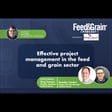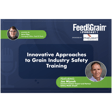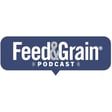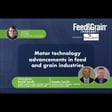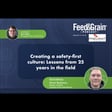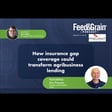
Grain bin safety essentials
In this episode of the Feed & Grain Podcast, host Steven Kilger sits down with John Lee, Director of Safety, Health, and Environmental Services at the Grain and Feed Association of Illinois, to discuss one of the most critical topics in agriculture: grain bin safety. With fall harvest just around the corner and the grain bins filling up, it’s the perfect time for a refresher on safety best practices.
John draws on over 25 years of experience in the industry to share practical safety tips and insights on preventing grain entrapment and engulfment incidents, which are unfortunately all too common. From proper grain conditioning and bin entry procedures to the essential personal protective equipment (PPE) every worker should wear, John covers it all. They also touch on the challenges of maintaining safe conditions in both commercial and on-farm storage bins, as well as the role of safety training in reducing risks.





